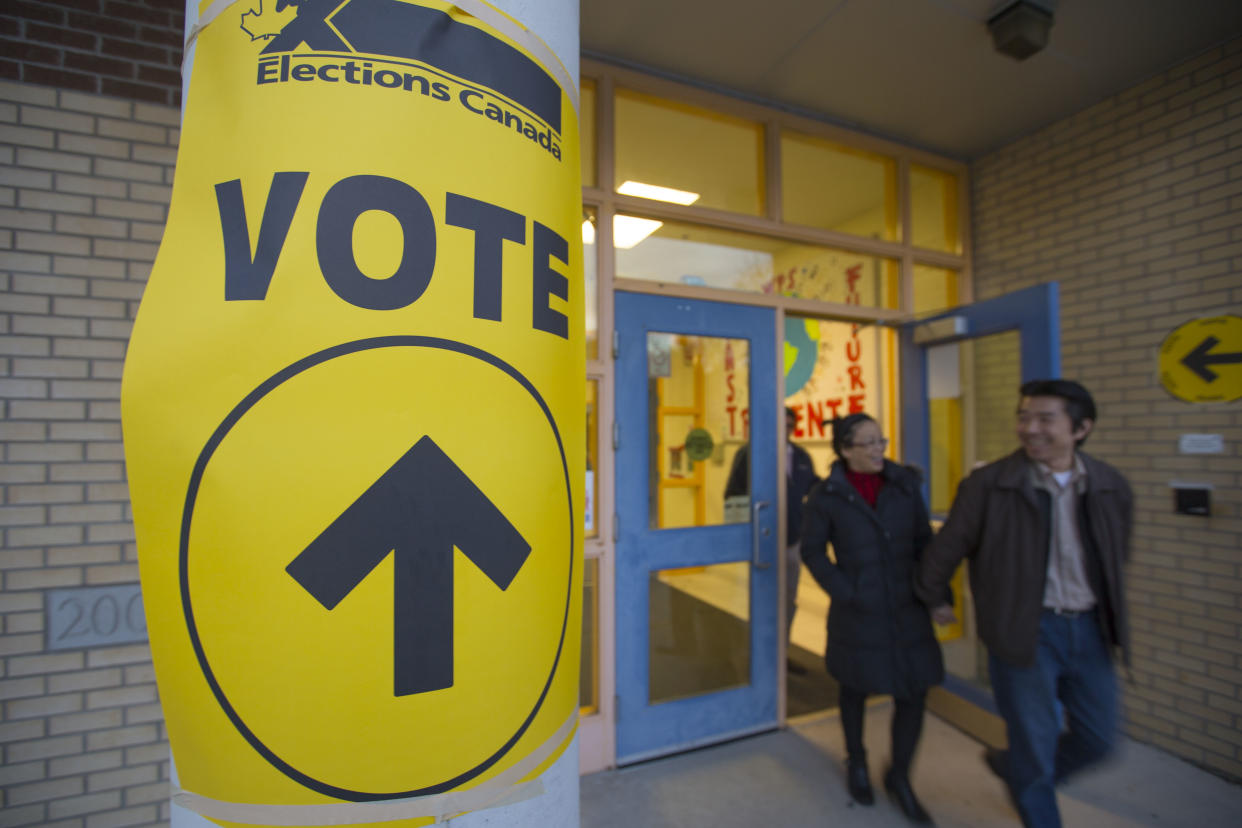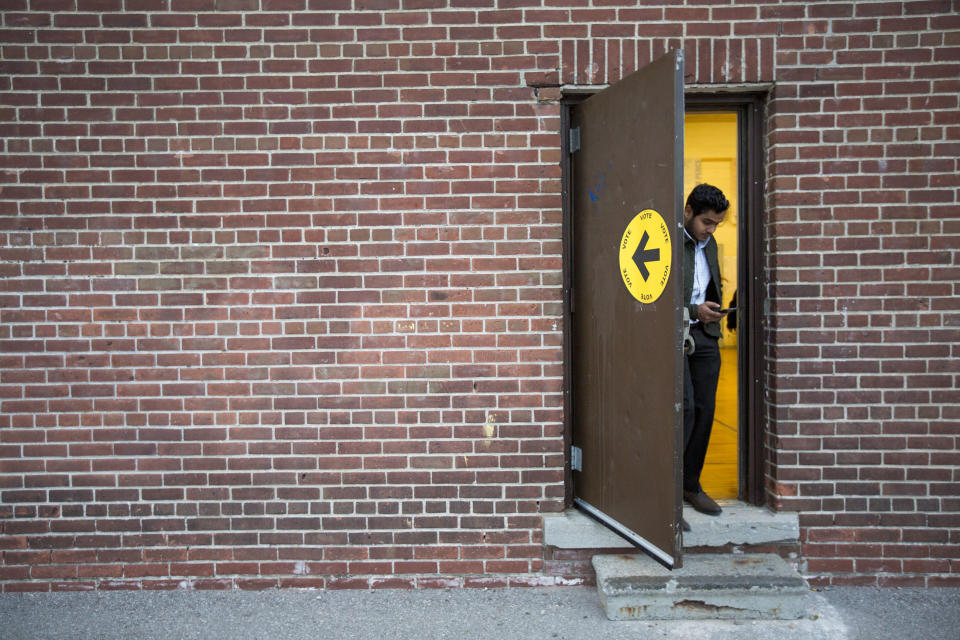What you need to know about the Jewish holiday that almost changed Canada's election day

For Chani Aryeh-Bain, the Conservative candidate for Eglinton-Lawrence, election day will look a lot different than it does for other candidates. On October 21, rather than casting her ballot and waiting for the election results with her team Aryeh-Bain, who is a religious Jew, will be observing the Jewish holiday of Shemini Atzeret, which starts at sundown on October 20 and ends at sundown on October 22.
For those two days, she is not permitted to work or use electricity, nor can she request that others do so on her behalf — so you won’t see an election results tweet from Aryeh-Bain’s team until Tuesday night.
When Aryeh-Bain was nominated in April, she immediately noticed the conflict and brought it to the attention of chief elections officer Stéphane Perrault, requesting that the election be moved to October 28. While Perrault does not have the authority to move the date of the election, he does have the power to recommend to the Governor in Council that the election date be moved. At the time, he responded that he would not recommend moving the date, but would work with the Jewish community to ensure they had alternative ways of voting.
Aryeh-Bain and Ira Walfish, a Jewish voter in Toronto, brought the case before the Federal Court, seeking a judicial review of Perrault’s decisions. On July 26, Justice Ann Marie McDonald ruled that Perrault redetermine his decision to better reflect the balance of the Charter of Rights and Freedoms with his decision. On July 29, Perrault decided, for the second time, that he would not recommend moving election day.
“It goes without saying, I was very disappointed,” Aryeh-Bain said to Yahoo Canada.
“It’s unfortunate. Basically he’s putting administrative concerns over the rights, the religious rights of 75,000 people,” Walfish said.
What is Shemini Atzeret?
For many people, this election issue is the first time they’re hearing about Shemini Atzeret, so it might seem easy to dismiss as a minor, unimportant holiday. Generally, Jewish holidays fall into two separate categories: holidays with specific customs, but don’t have religious restrictions, and holy days with very specific religious restrictions. Hanukkah, for example, falls into the first category, and Rosh Hashanah, the Jewish New Year, falls into the second, as does Shemini Atzeret. Observant Jews are prohibited from working, driving, using money, or using electricity. Campaigning and voting fall under the category of work.
Shemini Atzeret comes on the tail end of a string of Jewish holy days, starting with the more widely known Rosh Hashanah and Yom Kippur, followed by Sukkot, a holiday of thanksgiving and renewal, and ending with the back to back holidays of Shemini Atzeret and Simchat Torah, which celebrates a reaffirmation of faith.
“As an observant Jew, I can't ask another Jew to perform work prohibited work for me...on a holy day. I can't even ask a non Jew to do things that I myself wouldn't do,” Aryeh-Bain said.
The advance polls also pose a religious issue. They fall on October 11, 12, 13, and 14. The Sabbath comes in early evening of Friday the 11th, and finishes at about 7:30 pm on Saturday the 12th. Sukkot begins on the night of Sunday the 13th, and doesn’t end until the night of the 15th. That leaves workday hours of Friday the 11th or Sunday the 13th as potential voting days; however, as Walfish points out, that Sunday is an incredibly busy day as it’s the only available day to prepare for a two day holiday.
“Technically, of course, some people will go out and vote, but to get people to go out on that day, people just won’t do it,” Walfish said. “You couldn’t literally ask for a worse day.”
Before Aryeh-Bain took the issue to court, she consulted with leading rabbis who are experts in Jewish law, to see if they could find a way that she could campaign and get people out to vote — but it was quite clear there wasn’t much they could do.
Lorraine Weinrib is a professor of constitutional law at the University of Toronto Faculty of Law. “I think that it's very difficult for people who don't understand the framework of Jewish belief and observance to understand how restrictive these laws are,” Weinrib said to Yahoo Canada.

Charter implications
As chief elections officer, Perrault has the capacity to recommend to the Governor in Council that election day be moved if it conflicts with a religious holiday or another municipal or provincial election. The court case that Aryeh-Bain and Walfish brought forth essentially challenged Perrault to use that clause to move the date because of the conflict with Shemini Atzeret; however, Professor Weinrib said they may have been more successful if they had used the Charter of Rights and Freedoms to challenge the legislation of the fixed elections directly.
“If this candidate had come forward and just started a court case saying this makes it very difficult or impossible for an observant religious candidate to run for elections in this whole period, then we would have a much more stringent kind of review of the infringement of the right and whether it's justified,” she said.
There were two groups to consider in this case: the ability of Jewish voters to participate in the election, and the limits faced by Aryeh-Bain as an Orthodox candidate. The 2019 federal election is the first to have Orthodox Jewish candidates — Aryeh Bain in Eglinton-Lawrence and David Tordjman, the Conservative candidate running in the Quebec riding of Côte-Saint-Luc.
“So far as the Jewish voter goes, it's not an optimal way to vote for them. But we could manage with a lot of hard work to get them all out to vote,” Aryeh-Bain said. “But when it comes to the candidate, Perreault admitted that I'm at a disadvantage.”
While some may argue that the general public shouldn’t have to adjust for a small minority’s religious practices, “we don’t organize Canadian society like that anymore,” Weinrib said. “The Charter doesn’t let us organize it that way anymore.”
The riding of Eglinton-Lawrence
Aryeh-Bain is running against Liberal incumbent Marco Mendicino in the midtown-Toronto riding of Eglinton-Lawrence. Roughly 20 per cent of that riding is made up of Jews, including approximately 5,000 Orthodox Jews. While the riding historically votes Liberal in federal elections, with only one Conservative MP winning since 1979, the last few federal elections have been won by slim margins. Mendicino won by fewer than 4,000 votes in 2015.
Walfish points out that this is not the first time an election has conflicted with Shemini Atzeret; last fall, the Quebec election was held on the same holiday. Two ridings with high Jewish populations saw voter participation drop significantly.
“One of them went down from 72 per cent to 47. That’s nuts. One of them, D’arcy McGee, was in the top three [...] of the province in percentage of votes [in the previous election]. It dropped to the bottom three,” Walfish said.

How does this stack against other religious issues?
Mira Goldstein, a resident at Moishe House in Toronto, told Yahoo Canada that she’ll probably try and vote on the Sunday between the Sabbath and Sukkot, the holiday that begins on the evening of October 13. She no longer observes the holidays strictly in accordance with Jewish law, but still marks the holidays. She said it’s unfortunate that the election falls on a Jewish holiday, but points out that even within the Jewish community, people have trouble with scheduling in September and October because of all the holidays. “I think that there's serious religious discrimination happening in Canada right now, in Quebec, that I think is much more important to focus on,” Goldstein said.
Weinrib points to the passing of Bill 21 in Quebec, the bill that bans people who work in public service (including teachers) from wearing religious head coverings, like hijabs or kippahs, as another example of new legislation coming into conflict with constitutional law relating to religion.
“In a situation like this where we have a female religious candidate limited by her religious obligations, then it seems that the response under a charter claim is to think very carefully about how the Canadian legal system can accommodate so that these women can take part in political life and be elected and have their voices heard,” said Weinrib.
“The Jewish community, the Orthodox community really wants to be treated on the same level as everybody else. So religious minority rights is very important. We are a multicultural society here,” Aryeh-Bain said. ”Unfortunately in this election story there was a lot of talk but there was no walk.”
